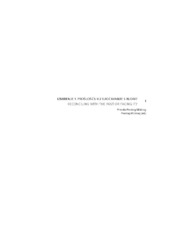Prikaz osnovnih podataka o dokumentu
Antinomije 'istine i pomirenja': postjugoslovenski slučajevi
Antinomies of 'Truth and Reconciliation': Post-Yugoslav Cases
| dc.contributor.editor | Milidrag, Predrag | |
| dc.creator | Karamanić, Slobodan | |
| dc.date.accessioned | 2017-11-01T10:15:49Z | |
| dc.date.available | 2017-11-01T10:15:49Z | |
| dc.date.issued | 2012 | |
| dc.identifier | 0353-5738 | |
| dc.identifier.uri | http://rifdt.instifdt.bg.ac.rs/123456789/418 | |
| dc.description.abstract | The paper offers a critical evaluation of the theoretical propositions and practical uses of the concept of “truth and reconciliation” (T&R), with special regard to the post-Yugoslav case studies. Firstly, the paper indicates an antinomy situated between the liberal principle of individual autonomy and attempts to establish an “organised memory.” Drawing from the concept of “Serbian collective responsibility,” it is demonstrated how this conceptual framework undermines both the political and private autonomy of citizen, by translating the question of responsibility into the collective moral and cultural domain. Secondly, the “organised memory,” which calls for identification with “national crimes”, creates a short-circuit, resulting in re-nationalising rather than de-nationalising the figure of citizen. As a result, the forms of organised national memory induce structural limitations, producing the fragmentation of truth into separate “national truths.”Thirdly, the concept is both abstract (prescriptive and trans-historical) and empirical (descriptive and enclosed within the framework of given subjectivities and categories). A paradoxical result is that T&R takes the consequences as its ends, whilst taking for granted the political identities constructed in the course of the conflict. In addition, the notion of truth in use here is reductive, aiming mostly at registering and measuring the “forensic truth” of the conflict. Finally, the absolute structural limitation of T&R represents the nation state itself. Since the alternative name of T&R is “official truth seeking” (Pricilla Hayner), this concept finds itself entrapped within the limits of the existing state’s institutional framework, depending on the “good will” of political elites. At the same time, the given “truths” are depoliticised and medicalised. The paper concludes that rather than opening new avenues for the emergence of genuinely new political subjectivities, the T&R paradigm effectively blocks the process of disidentification and the creation of a new political subject liberated from a narrowly defined community bound to the common (national) substance and history. | eng |
| dc.format | 23 3 (2012) 3-22 | |
| dc.format | application/pdf | |
| dc.language | sr | |
| dc.rights | openAccess | |
| dc.rights.uri | https://creativecommons.org/licenses/by-nc-nd/4.0/ | |
| dc.source | Filozofija i društvo/Philosophy and Society | mul |
| dc.subject | truth and reconciliation | |
| dc.subject | political subjectivity | |
| dc.subject | liberal democracy | |
| dc.subject | organized memory | |
| dc.subject | identification | |
| dc.title | Antinomije 'istine i pomirenja': postjugoslovenski slučajevi | sr |
| dc.title | Antinomies of 'Truth and Reconciliation': Post-Yugoslav Cases | eng |
| dc.type | article | |
| dc.rights.license | BY-NC-ND | |
| dcterms.abstract | Караманић, Слободан; Aнтиномије 'истине и помирења': постјугословенски случајеви; | |
| dc.citation.spage | 3 | |
| dc.citation.epage | 22 | |
| dc.identifier.doi | 10.2298/FID1203003K | |
| dc.type.version | publishedVersion | |
| dc.identifier.fulltext | http://rifdt.instifdt.bg.ac.rs/bitstream/id/4952/416.pdf |

